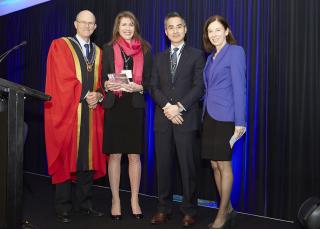
MJA, MDA NATIONAL PRIZE FOR EXCELLENCE IN MEDICAL RESEARCH
A STUDY of the rates of guideline-recommended investigations and therapies for acute coronary syndrome through Australia and New Zealand is the winner of the 2013 MJA, MDA National Prize for Excellence in Medical Research, for the best research paper published in the Medical Journal of Australia in the previous calendar year.
Entitled “Acute coronary syndrome care across Australia and New Zealand: the SNAPSHOT ACS study”, the winning paper was authored by Derek Chew, professor of cardiology at Flinders University in Adelaide, John French, director of the coronary care unit at Liverpool Hospital in Sydney, Tom Briffa, associate professor and head of the Cardiovascular Research Group at the University of Western Australia’s School of Population Health, Christopher Hammett, interventional cardiologist at the Royal Brisbane and Women’s Hospital, Christopher Ellis, a cardiologist at Auckland City Hospital, Isuru Ranasinghe, a cardiologist at the George Institute for Global Health in Sydney, Bernadette Aliprandi-Costa, project manager with the Department of Cardiology at Sydney’s Concord Hospital, Carolyn Astley, manager of the Cardiac Clinical Network at SA Health in Adelaide, Fiona Turnbull, co-director of the Cardiovascular Division at the George Institute for Global Health, Jeffrey Lefkovits, a cardiologist at the Royal Melbourne Hospital, Julie Redfern,
a research fellow in the Cardiovascular Division at the George Institute for Global Health, Bridie Carr, cardiac network manager with Agency for Clinical Innovation in Sydney, Greg Gamble, a biostatistician with the Department of Medicine at the University of Auckland, Karen Lintern, cardiac project officer with the Agency for Clinical Innovation, Tegwen Howell, acting manager of the Health Technology Assessment Team at the Clinical Access and Redesign Unit of the Queensland Department of Health in Brisbane, Hella Parker, program manager of the Cardiac Clinical Network at Victoria Health in Melbourne, Rosanna
Tavella, clinical data manager at SA Health in Adelaide, Stephen Bloomer, lead of the Cardiovascular
Health Network of Western Australia in Perth, Karice Hyun, statistician with the George Institute for Global Health, and David Brieger, head of Coronary Care and Coronary Intervention at Concord Hospital’s Department of Cardiology.
Despite well-developed guidelines for managing acute coronary syndrome (ACS), local registries in Australia and New Zealand have demonstrated incomplete implementation of evidence-based recommendations, with variations in care appearing to correlate with differences in clinical outcomes. Geographical challenges, patient characteristics (including cultural diversity), health workforce and the health policy environment are likely factors affecting the optimal translation of this evidence base into timely, effective and risk-appropriate ACS care.
This study set out to measure rates of guideline-recommended interventions and inhospital clinical ACS events using public records and health network data from 478 sites and 4398 patients with suspected or confirmed ACS across Australia and New Zealand.
Of the 1436 patients with myocardial infarction (MI), 1019 (71%) were treated with angiography, 610 (43%) with percutaneous coronary intervention and 116 (8%) with coronary artery bypass grafting.Invasive management was less likely with increasing patient risk (Global Registry of Acute Coronary Events [GRACE] score < 100, 90.1% v 101–150, 81.3% v 151–200, 49.4% v > 200, 36.1%; P < 0.001).
The inhospital mortality rate was 4.5% and recurrent MI rate was 5.1%.
After adjusting for patient risk and other variables, significant variations in care and outcomes by hospital classification and jurisdiction were evident.
The authors identified variations in the application of the ACS evidence base and varying rates of inhospital clinical events.
They concluded that “a focus on integrated clinical service delivery may provide greater translation of evidence to practice and improve ACS outcomes in Australia and New Zealand”.
The judges from the MJA’s Editorial Advisory Committee recognised that this research, conducted with robust and transparent methodology in a difficult real-world setting, contributes to the very important endeavour of improving the health of patients with suspected and confirmed acute coronary syndrome.
Sponsored by MDA National, this prize awards the authors a cash prize of $10 000.
